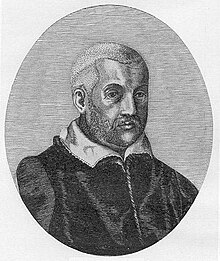Mark Antony Muretus
Marcus Antonius Muretus is the Latinized name of the French humanist Marc Antoine Muret (also Marc-Antoine de Muret ; born April 12, 1526 in Muret near Limoges , † June 4, 1585 in Rome ). At the age of eighteen, Muret drew the attention of Julius Caesar Scaliger and was invited to lectures at the archbishop's college in Auch . Afterwards he taught Latin in Villeneuve-d'Agen and then in Bordeaux , at the Collège de Guyenne from 1547 to 1548, when Michel de Montaigne also studied there and whose Graecum teacher he was. Some time before 1552 he gave a series of lectures in the College of Cardinal Lemoine , Collège du Cardinal Lemoine in Paris in front of a large auditorium, including King Henry II and Queen Catherine de Medici .
His success brought him many enemies who in 1553 had him thrown into prison on charges of heresy and sodomy , from which powerful friends, however, freed him again. The only way to avoid the same charge in Toulouse was to flee. The city's archives show that he was burned in effigy as a Huguenot in 1554 .
After an uncertain wandering life and a few years in Italy, he received an invitation from Cardinal Ippolito d'Este to settle in Rome in 1559 , which he also accepted. In 1561 Muret visited France again in the entourage of the cardinal at the conference between Catholics and Protestants in Poissy .
In 1563 he returned to Rome. His lectures gave him a European reputation, which is why he received a tempting offer from the King of Poland , Stephan Báthory , in 1578 to become a teacher of law in his new college in Cracow . Muretus, on the other hand, who had joined an order around 1576, was given the generosity of Pope Gregory XIII. induced to stay in Rome, where he died seven years later.
Text output, translations, comments
- Epistolae, hymni sacri et poemata omnia. Hierat, Cologne 1611 ( digitized edition 1614 )
- Orationes, epistolae et poemata. Edited by Johann Erhard Kapp and Jacob Thomasius. Gross, Leipzig 1750. ( digitized version )
- Opera omnia. Ex manuscriptis aucta et emendata (...) Edidit Carolus Henricus Frotscher. Serigiana Libraria, Leipzig 1841. ( digitized volume 3 )
- Letters in 3 books. Translated by Albrecht Roder. Teubner, Leipzig 1852.
-
Scripta selecta. Teubner, Leipzig.
- Volume 1: Oraioes, Praeftiones. 1871. ( digitized version )
- Volume 2: Epistolae, Varae Lectiones. 1873. ( digitized version )
- Pierre Blanchard (ed.): Marc-Antoine de Muret: La tragédie Iulius Caesar. Alidades, Thonon-les-Bains 1995 (text, French translation and commentary)
- Andreas Hagmaier (Ed.): MA Muret, Iulius Caesar. M. Virdung, Brutus. Two neo-Latin tragedies. Text, translation and interpretation (= contributions to antiquity , volume 235). Saur, Munich / Leipzig 2006, ISBN 3-598-77847-3 .
- Dietmar Schmitz (Ed.): Marcus Antonius Muretus: Caesar. Juvenilia. Peter Lang, Frankfurt am Main 1995, ISBN 3-631-40366-6 (Latin text, German translation, commentary)
- Kirk M. Summers (translator): The Iuvenilia of Marc-Antoine Muret. Ohio State University Press, Columbus 2006, ISBN 0-814-21037-6 (English translation and commentary)
literature
- Rudolf Pfeiffer : Classical Philology from Petrarch to Mommsen. Beck, Munich 1982, pp. 142f., 146, 170.
- Jürgen Blänsdorf : The transformation of the Senecan tragedy into Marc-Antoine Muret's “Julius Caesar” and Jacques Grévin's “César”. In: International Journal of the Classical Tradition 1, 1994, ISSN 1073-0508 , pp. 58-74
- Anja Wolkenhauer: Muretus, Marcus Antonius. In: Peter Kuhlmann , Helmuth Schneider (Hrsg.): History of the ancient sciences. Biographical Lexicon (= The New Pauly . Supplements. Volume 6). Metzler, Stuttgart / Weimar 2012, ISBN 978-3-476-02033-8 , Col. 861 f.
Web links
- Literature by and about Marc-Antoine Muret in the catalog of the German National Library
- Works by and about Marcus Antonius Muretus in the German Digital Library
Individual evidence
- ↑ Kirk M. Summers (Ed.): Marc-Antoine Muret: The Iuvenilia of Marc-Antoine Muret. Columbus (Ohio) 2006, p. XV.
| personal data | |
|---|---|
| SURNAME | Muretus, Mark Antony |
| ALTERNATIVE NAMES | Muret, Marc Antoine |
| BRIEF DESCRIPTION | French humanist |
| DATE OF BIRTH | April 12, 1526 |
| PLACE OF BIRTH | Muret near Limoges |
| DATE OF DEATH | June 4, 1585 |
| Place of death | Rome |
